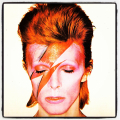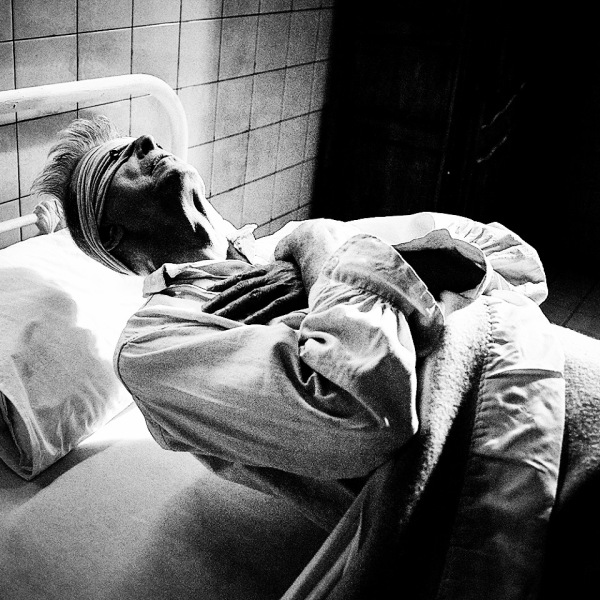EDITOR’S NOTE: This euology originally published in the wake of David Bowie’s death on January 10th 2016. We are re-posting it today on the occasion of his birthday and the kick-off of Philly Loves Bowie Week.
 BY JONATHAN VALANIA The year is 1980 and 14-year-old me drops the needle on Changesonebowie in my bedroom, with the door locked because this is serious business, while staring at the album cover, trying to figure out how all these startling and seemingly disconnected musics — space-age psych folk, white plastic soul, zooming Brechtian glam, bloozy garage-punk, coked-up funk, Teutonic trance-rock, proto-electronica — came out of this one delicate man with impeccable hair and immaculate cheekbones. Thirty-six years later I still don’t have a good answer beyond this: Clearly, he is from another planet. Clearly.
BY JONATHAN VALANIA The year is 1980 and 14-year-old me drops the needle on Changesonebowie in my bedroom, with the door locked because this is serious business, while staring at the album cover, trying to figure out how all these startling and seemingly disconnected musics — space-age psych folk, white plastic soul, zooming Brechtian glam, bloozy garage-punk, coked-up funk, Teutonic trance-rock, proto-electronica — came out of this one delicate man with impeccable hair and immaculate cheekbones. Thirty-six years later I still don’t have a good answer beyond this: Clearly, he is from another planet. Clearly.
The year is 1983 and I am teetering on my seat, dizzy from the thin air — and perhaps an illicit beer or seven in the parking lot — way up in the nosebleed section of the Spectrum for the Philly stop of Bowie’s Serious Moonlight Tour. Though we seemed miles away from the stage, there was no missing that hot mustard yellow double breasted suit and the curly shock of electric blond hair or that voice — river deep, mountain high, smooth as crushed velvet and sharp as shattered glass, it contained multitudes. You could hear the whole 20th Century in that voice.
The year is 1984, I walk into the only edgy/cool fancy-pants hair salon in Allentown, PA, with the cover of Heroes under my arm. “This is what hair is supposed to look like,” I tell them. “Make me look like this.” When they get done, they insist I look just like the guy on the cover of Heroes, but looking in the mirror I can tell they are lying. A hard lesson was learned on that day: Being David Bowie is harder than it looks. Much harder.
The year is 2004, I am a journalist working on a magazine profile of the Polyphonic Spree who have been hand-picked by David Bowie to be the opening act for what will prove to be his  final American tour. We are standing in the support act dressing room — me and 12 gangly, funky-smelling Texans wearing white Jesus robes and dirty Chuck Taylors — deep in the bowels of the Wachovia Center waiting for The Man Who Fell To Earth to pop in for one of those faux-spontaneous carefully-arranged candid shots for the Random Notes section of Rolling Stone. It’s noisy, hot and locker room-rific in here. When he finally arrives literally everyone gasps and the room falls pin-drop silent: It’s David Fucking Bowie. He is elegant and gracious and shorter than he looks on TV. I shake his hand just to prove to myself that this really happened.
final American tour. We are standing in the support act dressing room — me and 12 gangly, funky-smelling Texans wearing white Jesus robes and dirty Chuck Taylors — deep in the bowels of the Wachovia Center waiting for The Man Who Fell To Earth to pop in for one of those faux-spontaneous carefully-arranged candid shots for the Random Notes section of Rolling Stone. It’s noisy, hot and locker room-rific in here. When he finally arrives literally everyone gasps and the room falls pin-drop silent: It’s David Fucking Bowie. He is elegant and gracious and shorter than he looks on TV. I shake his hand just to prove to myself that this really happened.
The year is 2016. It’s the morning after I heard on the BBC somewhere around 2 AM that David Bowie died. I’m still having a hard time processing it. I feel like a part of me is gone. I’m driving around Philadelphia, the city where David Bowie recorded three albums (Young Americans, Live, Stage), going nowhere in particular. Philly is a big Bowie town. Back in the day, he would sell out the Tower six nights in a row and tickets were a whopping $5. WXPN is playing non-stop Bowie and I have the radio cranked up to 11. “Heroes” comes on and I crank it up to 12. It’s my favorite Bowie song. I lose it somewhere around the third verse, when he sings “I, I can remember…standing by the wall” and the back-up singers repeat his words back to him like horns. That’s when it hits me like a hammer: David Bowie is fucking dead. Tears roll down my cheeks like I’m watching the end of It’s A Wonderful Life. I flick on the windshield wipers even though it’s not raining. 
But as the song fades out it occurs to me that that’s not true at all. David Bowie is not dead. Because David Bowie will never die. Oh sure, that guy born David Robert Jones is gone, and that’s a terrible loss for his friends and family. But people like you and me, we never knew that guy. We knew David Bowie, or more accurately we knew the idea of David Bowie. Because in the end David Bowie was, above all things, an idea, a brilliant idea, but an idea nonetheless and you cannot kill an idea. Not even cancer can kill an idea. And that idea is this: we are the imagination of ourselves. We control the illusion and we can change it any time we want. We can be black, white, striped, gay, straight, bi, trans, Martian, glam, goth, hot funk, cool punk, old junk, a bottle blonde, a ginger, a jazzer or even drums n’ bass. There is no right answer. But sooner or later, you become yourself. That is the idea of David Bowie. And that will never die.

